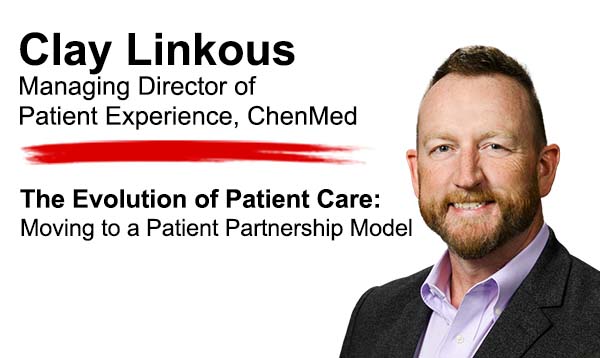57_The Evolution of Patient Care: Moving to a Patient Partnership Model with Clay Linkous
Hosted by Dan Collard with special guest Clay Linkous
Like most of us, Clay Linkous—managing director of patient experience for ChenMed—is a product of his life experiences. His approach to healthcare is an aggregation of what he’s learned from his background in exercise science, a full-time ministry role, a black belt in Six Sigma, his master’s in healthcare administration, and his marriage to a critical care nurse. His background has shaped a leader who is driven by compassion, innovation, measurement, and, of course, good outcomes.
In this podcast, special guest host Dan Collard, co-founder/partner with Quint Studer of Healthcare Plus Solutions Group, talks with Clay about the evolution of the patient experience. Linkous says we’ve moved from patient satisfaction (how happy they are) to evidence-based practices (measuring how well clinicians do the things that result in great care) to patient engagement (getting patients more invested and involved in their own care after they leave the hospital setting).
Clay explains that we are now in the patient partnership phase, which means we not only try to affect outcomes at the bedside, but we work to change patient behaviors (diet, exercise, etc.) that are impacting their overall health. This level of compliance from patients requires a trusting relationship with providers. High levels of trust lead to better listening and more compliance, thus better outcomes.
So how do we build this level of trust? Linkous says we start by reducing anxiety by creating more experiences that lead to positive emotions and fewer that lead to negative ones. Clay says that ChenMed has some interesting models in place for building trust. Their approach involves building on some foundational things that have worked well, infusing new learning from neuroscience around human behavior, and learning from organizations outside the industry, like Ritz-Carlton and Chick-Fil-A.
Chen Med is also taking a closer look at the social determinants of health for their patients. By thinking more broadly than traditional medicine and looking at how housing, transportation, and other factors that happen away from the bedside impact the patient partnership, they have been able to get better outcomes.
While they are still innovating and evolving, one thing is for certain. Linkous believes that all of this requires leaders and the care team to feel (and express) a deep compassion and care for others. The old adage comes to mind: People don’t care how much you know until they know how much you care.





